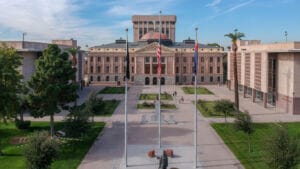NAIOP Roundtable 2010: Q&A With Members of NAIOP
Members of NAIOP-AZ sat down with AZRE magazine in a roundtable discussion, discussing the state of the local commercial real estate industry.
 |
 |
NAIOP Roundtable 2010 Participants: |
|
| 1 — DW: Deron Webb, Managing Principal, Wentworth Webb & Postal | 5 — BM: Bob Mulhern, Managing Director Greater Phoenix, Colliers International |
|
2 — JB: Jodi Bailey, VP Property Management Services, Transwestern |
6 — KR: Kurt Rosene, Senior VP, The Alter Group |
| 3 — WS: William L. Spart, Senior VP & Manager, Middle Market Real Estate, Wells Fargo Bank | 7 — TH: Todd Holzer, VP of Development, Ryan Companies US |
| 4 — MH: Mike Haenel, Executive VP, Industrial Group, Cassidy Turley/BRE Commercial | 8 — JD: John DiVall, Senior VP, Liberty Property Trust |
Economy
TH: We are more than two years into the so-called “Great Recession.” How much longer will it last? Will Arizona pull out the same time as the rest of the nation? Since the commercial real estate industry is closely tied to the job market, it’s been a bumpy ride.
Q: What is different in July 2010 in our local commercial real estate industry than a year ago?
MH: The two biggest differences today compared to a year ago, are that tenant demand is on the rise and there are limited distressed industrial real estate opportunities available for sale. It’s important to note that, because we have not seen the oversupply of distressed real estate hit the market, values are higher than we thought they would be given the overall market conditions. This has translated into a significant and noticeable increase in tenant demand.
JD: It is marginally better. As part of the Arizona NAIOP, I wish I could say substantially better, but it’s not. There is more activity, but rates are still depressed, and we are now in the summer doldrums. We are clearly experiencing a jobless recovery. With no new construction on the horizon, we should gradually absorb space and improve.
WS: There are more lenders jumping into the market. We are seeing conduit, CMBS, life and other banks. A year ago we did not see much activity.
Q: How would you compare our Metro Phoenix commercial real estate market to other major markets throughout the Western U.S.?
BM: Phoenix’s metro commercial real estate market has been hit harder than most Western cities, with Las Vegas being the exception. At the end of the second quarter Phoenix vacancies for office (29 MSF/22.5%), industrial (41 MSF/17.7%) and retail (28 MSF/13.3%) were all in historically high ranges, and they remain significantly higher than other Western cities such as Denver (6.7% industrial/14.8% office), San Diego (8.7% industrial/16.2% office), and Los Angeles (not including Orange County and the Inland Empire — 5.0% industrial/12.7% office). Most of the basic fundamentals that draw people to the Valley are still in place, but the lack of job growth, coupled with the depressed residential housing market, are continuing to act as detriments to a commercial real estate rebound. Recognizing these realities, it should be noted that multi-family sales, for which purchase financing is available, are very strong, and that foreign investors, especially from Canada, are entering the market and helping create some velocity in the private client sales market.
JB: Phoenix is a very dynamic commercial real estate market with a highly skilled labor force, an abundance of labor because we are a right-to-work state with competitive wages, and reliable, lower cost energy sources for large users. Ultimately, this means that we attract a wide variety of users from semiconductor manufacturers, biotech/life science laboratories, aerospace and Department of Defense manufacturing, as well as back office and data center occupiers of space. Each building occupier has their reasons for choosing Phoenix over other markets, but we find ourselves to be very competitive as compared to other regional markets.
TH: Phoenix is in the infamous Bermuda Triangle of both residential and commercial real estate, which also includes Las Vegas and the Inland Empire of California. Because of the housing market dive, cities in this area went into recession mode before the rest ofthe nation, and the drop in our economy has been greater than most. Los Angeles, San Francisco and Seattle keep their economy above water due to Pacific Rim trade. Denver has energy and high tech, and Salt Lake City was not overbuilt. Texas has fared well due to energy and the George W. Bush presidency. It will be a long and difficult struggle for Metro Phoenix to pull out of the tough times it finds itself in.
Q: How are the boycotts and state public policies affecting our industry?
BM: I have not heard one comment about the boycott in our offices or from any of our clients, which is an indication to me that the boycotts, though serious issues, do not rank high in the commercial real estate priorities of concern. Shrinking rents and occupancies are a much bigger issue these days.
Regarding public policy, the inability of the federal and state governments to implement policies and programs to stimulate job growth is prolonging our recession. There will not be a jobless recovery so, until jobs are created, our industry is continuing to experience high levels of tumult.
Public policy toward banks is also prolonging our recession as the de-leveraging process is being allowed to be spread over time, preventing the painful, but inevitable total market reset necessary to stabilize the real estate market and allow it to begin to create some positive momentum.
TH: The boycotts are affecting the convention and tourist sector, but I do not believe that they have affected the office and industrial markets here in Arizona. Companies choose to come here due to the ease of doing business and quality of life, not due to our state’s policy on immigration. That being said, our state needs to make job creation and business attraction a primary focus. We need the Legislature and the governor’s office to make jobs our No. 1 priority. I suggest a formal jobs bill from our legislative leadership should come forward that includes a lower tax burden on hiring businesses and commercial property owners.
DW: After the initial national “knee jerk” reaction of higher deficit spending and dubious stimulus policy, leaders underestimated the outcry and we did not do a good job of getting the message out nationally. Projects have been stalled and some major players are taking a wait-and-see attitude. Any time there is substantial disturbance, those active in the market cool.



